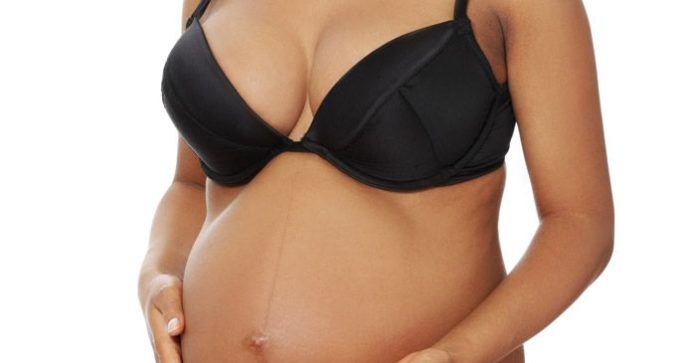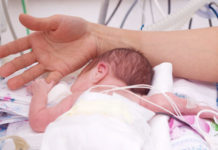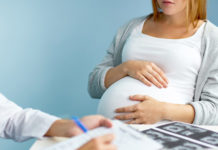The breast symptoms of pregnancy and preparing for breastfeeding affect all women differently. You may experience some of the symptoms and changes discussed below and not others, or you may experience them all. Any combination of breast symptoms in pregnancy is normal, it just depends on your body. While you may find some of the changes (e.g. larger breasts) pleasant, you may also find some uncomfortable and unpleasant. Wearing a maternity bra during pregnancy can help relieve the breast symptoms you experience.
Breast symptoms of pregnancy
Your breasts will change considerably during the course of your pregnancy and the changes will probably begin early in the first trimester, as your breasts begin their preparation for lactation (producing breastmilk). There are a number of changes you should be prepared for:
- Increase in size;
- Sore or tender breasts;
- Leaking nipples;
- Changes in the appearance of breasts and nipples.
Increase in size
You’re probably already expecting your breast to get bigger, and depending on the normal size of your breasts and your ideal body shape, this might be something you’re looking forward to (or dreading). You may notice an increase in your breast size as early as the pregnancy week 4, and your breasts will continue to increase in size for about the first four months of pregnancy (week 16), after which many women find their growth stabilises. Breast tissue extends into the armpits and some women also notice swelling in the armpit region during pregnancy.
By the fifth month of your pregnancy, don’t be surprised if your breasts are a full two cup sizes larger than they were before you got pregnant. However, it’s also important to bear in mind that some women’s breasts grow more than others – don’t be concerned if your breasts don’t grow quite that much. By the end of pregnancy expect your breasts to account for 1-3 pounds (about 1 kg) of the pregnancy weight you’ve gained. Most of the weight gain in your breasts is a result of the milk producing glands increasing in size and an increased volume of blood in your breasts.
Sore or tender breasts
Many women also find that their breasts are tender, sore or tingly during pregnancy and this may be one of the first pregnancy symptoms you notice. As they increase in size your breasts may also begin to feel fuller and heavier. These changes, which occur because of the increased levels of the hormones progesterone and oestrogen in your body during pregnancy, may occur as early as the first month of pregnancy. In some cases tender breasts are the first sign of pregnancy and the trigger to take a pregnancy test.
Leaking nipples
 It is common for small amounts of milk to leak from your breasts, even during pregnancy before you have started breastfeeding. Breast leakage during pregnancy is completely normal and can happen at any time, but is most common after the sixth month of pregnancy. It may be particularly likely to occur while your breasts are being massaged or sexually stimulated.
It is common for small amounts of milk to leak from your breasts, even during pregnancy before you have started breastfeeding. Breast leakage during pregnancy is completely normal and can happen at any time, but is most common after the sixth month of pregnancy. It may be particularly likely to occur while your breasts are being massaged or sexually stimulated.
Don’t be concerned if your breasts leak, but bear in mind that not all women experience leaking breasts while they are pregnant. If they don’t leak, make the most of it while it lasts. No leaks during pregnancy does not mean you won’t be able to breastfeed your baby after childbirth – soon enough you’ll have milk flowing when you breastfeed and probably leaking a bit in between feeds (and may just find yourself wishing for the good old no-leak days!).
The breasts are usually able to produce breastmilk after pregnancy week 16 and from this time onwards you may start to notice a few leaks. The milk that leaks out during pregnancy is a thick yellowish substance called colostrum. It’s the early form of breastmilk which contains the right combination of nutrients and infection-fighting antibodies to keep your newborn baby well-nourished and healthy in its first days of life. Occasionally women have blood leak from their breast during pregnancy. In some cases this is caused by new blood vessels growing in the breast and is nothing to worry about. However, if you do experience blood leaking from your breasts when pregnant, you should have your doctor check your breasts to make sure there is no problem.
Changes in the appearance of breasts and nipples
Be prepared for the appearance of your breasts and nipples to change. The shape and colour of your nipples is likely to change fairly early in pregnancy and you may even notice changes in your nipples about the time you realise you are pregnant. The dark patches of skin which surround your nipples (called the areolas) usually become darker during pregnancy because of the increase in blood flow to your breasts and the growth of new pigmented cells. Your nipples may even stay darker after you have given birth and finished breastfeeding.
Small bumps form a ring around the edge of the areola during pregnancy and remain for the duration of breastfeeding. Known as Montgomery’s tubercles, these tiny glands produce substances which lubricate and disinfect the nipples during breastfeeding. They may appear early in pregnancy or not until the third trimester.
Your nipples may stick out and become larger than usual. Some women’s nipples become inverted (start to point into the breast instead of away from it) during pregnancy. If this happens to you, don’t worry. You’ll still be able to breastfeed your baby but might need a nurse to help you get started.
During the sixth month of pregnancy you may also notice changes in the appearance of your breasts. The blood vessels in them will probably become more prominent. They’ll look like pink or blue lines which show through your skin.
Breast symptoms during breastfeeding
 Your breasts will not return to their normal size and shape until you stop producing milk. While you continue to breastfeed, your breasts will continue to produce milk, and so your breasts will continue to look and feel different.
Your breasts will not return to their normal size and shape until you stop producing milk. While you continue to breastfeed, your breasts will continue to produce milk, and so your breasts will continue to look and feel different.
Larger breasts
Your breasts will be larger during breastfeeding due to the breastmilk in them. Your breast size may increase further after child birth.
Sore, hard, engorged breasts
In the period after childbirth while you are getting used to breastfeeding, it is very normal to experience sore breasts. They may also become hard or lumpy or feel engorged. These changes are most common and severe about three days after childbirth, when breastmilk changes its form from colostrum (the yellow substance which leaked out during pregnancy and which nourished your baby for the first few days) to normal breastmilk. As your breasts adjust to lactation and breastfeeding the pain should reduce, although some breastfeeding women report their breasts being painful for six weeks after childbirth. Engorgement may persist, but breastfeeding your baby in different positions or expressing milk can relieve the feeling of engorgement.
How does wearing a maternity bra relieve the breast symptoms of pregnancy and breastfeeding?
Coping with larger breasts
The most noticeable change in the breasts during pregnancy is their increasing size, and breasts may enlarge even further after childbirth, when breastmilk production starts in earnest. You will probably outgrow your bras in the first few months of pregnancy. Bigger breasts need more support, and maternity bras are specially designed to support the larger-than-usual breasts of pregnant and breastfeeding women. Wearing a maternity bra may make it easier to cope with your increasingly large breast size, and relieve some of the discomfort in your breasts. Many women feel more comfortable when their breasts are supported by a bra and this is especially true for women with large breasts. Whether or not you consider your breasts large at the beginning of your pregnancy, you may do by the end of your pregnancy. Wearing a bra may simply be a matter of comfort.
Reducing breast stretching
If you’re worried about your breasts stretching during pregnancy and becoming saggy afterwards, wearing a maternity bra during pregnancy may reduce the degree to which your breasts stretch.
Reducing pain when suppressing lactation
If you do not want to breastfeed, wearing a well-fitting bra after childbirth can help reduce pain in the breasts while you wait for lactation to stop.
Catching leaks
Your breasts may start to leak any time after week 16 of pregnancy. There is not much you can do to stop the leaks, and the best option is to use breast pads to absorb the fluid which leaks out. You can fit breast pads inside your maternity bra. If your breasts leak during the night, you may like to wear your bra to bed.



 (5 votes, average: 4.20 out of 5)
(5 votes, average: 4.20 out of 5) 






